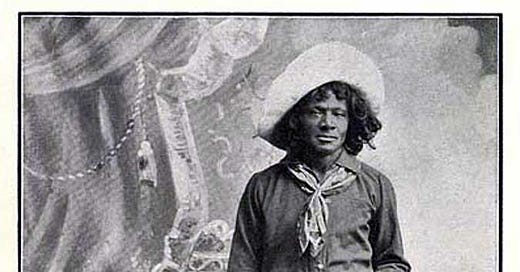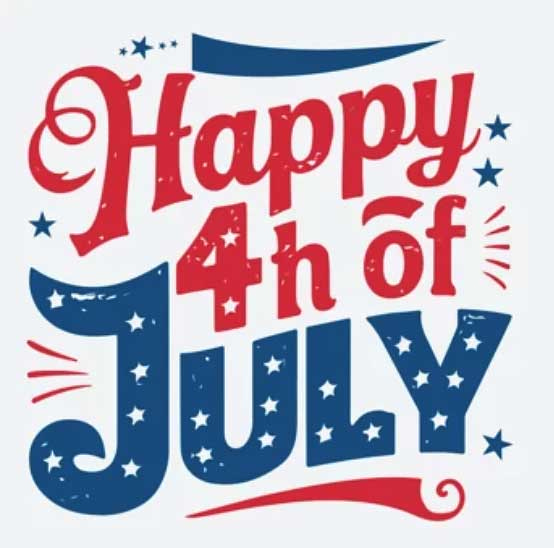I’ve been thinking about rodeos and Fourth of July celebrations this week, which brought me to Nat Love, whose fame was born on the Fourth of July.
Love is one of history’s most famous rodeo performers, and the only black cowboy to write about his experiences driving cattle on the Chisholm Trail after the Civil War.
Nat (pronounced Nate) was born into slavery in June 1854 on Robert Love’s plantation in Tennessee. His father was a slave foreman and his mother the head of the kitchen. Despite the fact that black literacy was banned by law, Nat’s father taught him to read and write.
Nat’s father died shortly after slavery ended, and Nat took a job on a neighboring farms to help his family survive. There he learned how to break horses. He won a horse in a raffle and sold it back to its owner for $50. He used the money to head West.
In Dodge City, Kansas, he came across the crew of the Texas Duval Ranch. The trail boss agreed to give him a job if he could break a horse called “Good Eye,” the wildest horse in the outfit. Nat later said it was the toughest ride he’d ever had, and it earned him a job with the ranch for $30 a month.
After three years with the Duval Ranch, Nat headed for Arizona, where he got a job with the Gallinger Ranch on the Gila River. With that crew, he traveled many of the major western trails, working in dangerous situations in battles with Indians, rustlers, and bandits. In his autobiography he claimed he met Pat Garrett, Bat Masterson, and Billy the Kid.
On July 4th, 1876, Nat Love entered a “cowboy” contest in Deadwood, South Dakota. He won the rope, throw, tie, bridle, saddle, and bronco riding contests. His remarkable skills and daring nature reminded people of the fictional dime-novel hero Deadwood Dick, and the name stuck. From then on, Love was known as “Deadwood Dick,” a title that further solidified his legendary status in the Wild West.
Mounted on my favorite horse, my…lariat near my hand,
and my trusty guns in my belt…I felt I could defy the world.
— Nat Love in The Life and Adventures of Nat Love, 1907
The next year Love was captured by a band of Pima Indians while rounding up stray cattle near the Gila River. While trying to avoid capture, he was shot numerous times. He wrote that he was spared and nursed back to health by the Indians because they respected his heritage, since a large portion of the band themselves were of mixed blood. “I carry the marks of fourteen bullet wounds on different parts of my body, most any one of which would be sufficient to kill an ordinary man, but I am not even crippled.”
In spite of the hospitality of the Pima Indians, when Love recovered he stole a pony and escaped to west Texas.
By 1889 Love decided to leave the cowboy life to settle down and get married. He took a job in Denver, Colorado, as a Pullman porter on the Denver and Rio Grande Railroad and worked the routes west of Denver. He finally settled down in southern California with his family.
In 1907, Love published his memoirs under the title The Life and Adventures of Nat Love, Better Known in the Cattle Country as “Deadwood Dick,” by Himself. “Written with an air of braggadocio, parts of Nat’s story are of questionable veracity. Nevertheless, it is a charming first-hand account of the life of one cowboy that emphasizes the necessity of cooperation and camaraderie in the performance of work on the trails, ranges, and ranches of the cattle kingdom,” writes American Black History.
As Love put it, “I had an unusually adventurous life.”
“Facing storms and droughts, competing ranchers and rogue cowboys, encounters with Americans Indians and cattle thieves, Love lived the kind of exciting life that has been mythologized by American culture,” says the National Museum of American History.
Nat Love, America’s most famous black cowboy, passed away at age 67 in 1921 in Los Angeles, California, where he’d been working as a courier and guard for a Los Angeles securities company.
**********
Cowboy Lingo of the Day
The cowboy called his rope by slang names such as line, clothes line, string, hemp, manila, whale line, lass rope, twine, and cat-gut, among others.






Was not aware of his stint as a Pullman porter. His story would make a great bio pic.